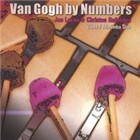Home » Jazz Articles » Album Review » Joe Locke / Christos Rafalides Vibes / Mallet Duo: Van G...
Joe Locke / Christos Rafalides Vibes / Mallet Duo: Van Gogh by Numbers
Van Gogh by Numbers teams him with Christos Rafalides, a late-1990s graduate student of Locke's from the Manhattan School of Music. Rafalides may have been his student then, but he's on equal footing here, fully sharing the spotlight in both composition and performance. Locke stays mainly on vibes and Rafalides on marimba, the two swapping instruments only twice—on Rafalides' bright "Pandora's Dance" and Locke's poignant "Waking Now, I Wonder."
The textural nature of the two instruments—the vibes' brighter colours and the marimba's darker, woodier sound—works exceptionally well together, creating a sound that's full yet spacious. While there's room for dense harmonic clusters, the music never become cluttered. Locke's title track sets the tone for the album, often made up of long-form and winding melodies with shifting bar lines and a seamless tag-team approach to trading solo and accompaniment duties.
Locke's "Suite di Morleo" first surfaced on Four Walls of Freedom's eponymous 2003 debut, and "Movement #3: Waking Now, I Wonder" appeared in a more melancholy reading on woodwind multi-instrumentalist Tim Garland's Storms/Nocturnes (Sirocco, 2001) as "The Lost Lenore." The duo's approach to this suite proves just how malleable Locke's writing can be. The first movement features an elegant Locke solo that demonstrates just how well he can marry formidable technique with the emotional needs of a song. The second movement, while ultimately resolving into something more rhythmic, remains more a slow simmer than the energetic boil of Four Walls of Freedom. The third movement is taken at a faster pace than on Storms/Nocturnes; Locke's marimba carries the pulse, while Rafalides' vibes stand out up front with the lyrical melody.
The duo also reinvents a pair of standards. "Love is a Many Splendored Thing" becomes an idiosyncratic 9/8 romp, while Miles Davis/Bill Evans' "Blue in Green" trades in its more atmospheric origins for a surprisingly insistent pulse.
Throughout Van Gogh by Numbers Locke and Rafalides demonstrate the kind of shared understanding that explains why the duet is perhaps the most intimate of all possible musical ensembles. With only two players in the conversation, it's possible for each one to be totally focused on what the other is saying without interruption, and both Locke and Rafalides are sensitive listeners indeed.
This recording is available at CDBaby on the web.
Track Listing
Van Gogh by Numbers; Sorayia; Love is a Many Splendored Thing; Sword of Whispers; Pandora's Dance; Suite di Morleo: Movement #1: Now I Lay Me Down; Movement #2: Now in Darkness I Dream; Movement #3: Waking Now, I Wonder; Danzon en Primavera; Blue in Green.
Personnel
Joe Locke
vibraphoneJoe Locke: vibes, marimba (5, 8); Christos Rafalides: marimba, vibes (5, 8).
Album information
Title: Van Gogh by Numbers | Year Released: 2006 | Record Label: Wire Walker
< Previous
Hokane
Comments
Tags
For the Love of Jazz
 All About Jazz has been a pillar of jazz since 1995, championing it as an art form and, more importantly, supporting the musicians who create it. Our enduring commitment has made "AAJ" one of the most culturally important websites of its kind, read by hundreds of thousands of fans, musicians and industry figures every month.
All About Jazz has been a pillar of jazz since 1995, championing it as an art form and, more importantly, supporting the musicians who create it. Our enduring commitment has made "AAJ" one of the most culturally important websites of its kind, read by hundreds of thousands of fans, musicians and industry figures every month.




















